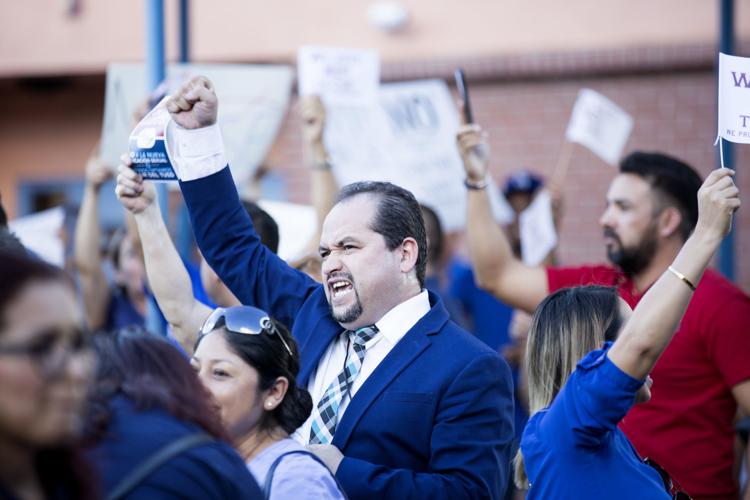A vote on changes to TUSD’s curriculum that dictates how sex-ed is taught has been delayed to give the district’s governing board more time to consider recommended changes made by the superintendent.
Hours before the board meeting Tuesday night, Superintendent Gabriel Trujillo said it would likely take the rest of the semester for the district to meet his recommended additions.
Among the changes to the Family Life Curriculum Trujillo said he seeks is an emphasis on abstinence as the primary and most effective method of avoiding unplanned pregnancies and exposure to sexually transmitted infections.
Arizona law says any sex education curriculum must emphasize that abstinence is the only method for avoiding pregnancy that is 100% effective. The proposed curriculum for Tucson Unified School District features abstinence in two lessons.
Trujillo’s recommendation would increase the focus on abstinence to six or seven lessons. For example, the high school lesson that deals with life management would incorporate abstinence.
“That’s not saying that I am promoting an abstinence-only curriculum,” Trujillo said at a news conference hours before the meeting. “I am promoting a well-rounded curriculum that presents a lot of options for contraception, but I am insisting that abstinence be at the top of that list.”
Other conditions Trujillo proposes for lessons TUSD families have to “opt-in” for students to take include:
• A districtwide “teach-in” for parents and students, which would include workshops, breakout sessions and reviewing the Family Life lessons.
• An alternative curriculum for families who do not opt-in to the classes, which would be aligned with academic standards and publicly available.
• Professional development and training for a lead educator at every school who would facilitate the Family Life instruction. The lessons must follow district policies that require an environment free of harassment and discrimination and prohibits educators from inserting their personal, political or religious beliefs into the instruction.
• Prohibiting the purchase of any outside curriculum materials and committing to transparency with any additional TUSD-developed materials.
• Each school to have a primary crisis contact, who is either a counselor or social worker, should any student get triggered by the content. That could include victims of abuse or students questioning their gender identity or gender expression.
• Formatting each grade’s curriculum to include a curriculum map; the concepts and themes; and a brief summary of major learning goals.
The board delayed the vote Tuesday after many contentious hours both inside and outside the meeting room. The controversy over TUSD’s proposed update to its Family Life Curriculum, which includes not just sex education, but lessons on healthy self-esteem, boundaries and respect for others, has ballooned into what board member Mark Stegeman called one of the biggest issues of his 11-year tenure.
Two opposing sides faced off in the courtyard outside the board meeting. Fists pumping the air, signs held high, each side chanted for the board to vote either yes or no on the new curriculum.
A common objection from the opposition is that sex education should be taught at home and not offered in school at all. Others don’t like that the curriculum explains gender identity and expression as well as sexual orientation and identity, acknowledging LGBTQ students and families.
Some critics said the curriculum sexualizes children, comparing it to child abuse and implying it will ruin students’ lives. Several opponents evoked their religious beliefs and said the curriculum goes against God.
Gabriel Corella was one of the people leading the charge of the opposition.
“They cannot erase our culture,” he said in an interview. “For us, it’s not age-appropriate.”
Corella compared the curriculum to pornography. He said he lives on the south side and within TUSD boundaries but chose to put his 5-year-old into private school because he fears the board will pass the curriculum.
Those in support of the curriculum say it’s not only inclusive but medically accurate, age-appropriate and comprehensive. They say it’s important that students have access to a curriculum that talks about healthy relationships and boundaries; consent; ways to prevent teen pregnancy and contracting sexually transmitted infections; and which acknowledges the experience of all students, including those who are a part of the LGBTQ community.
Luie Gonzalez, an 11th-grader in the Amphitheater Public Schools district and wearing a shirt with rainbow stripes down the arms, was at the board meeting to support the curriculum. He said he didn’t receive any sex ed in his high school.
Amphitheater has a maturation/sex education curriculum, approved this April, offered in Grades 4 through 8, which covers human reproduction and the risks and responsibilities of sexual activity, with a focus on abstinence but with information about birth control, said Michelle Valenzuela, a district spokeswoman.
Gonzalez said sex ed is important for kids to learn in order to keep themselves safe. He said even though he isn’t in TUSD, he came to the meeting to support his LGBTQ community.
Most local school districts have some sort of board-approved sex education curriculum, which focuses on abstinence but teaches forms of contraception and STI avoidance, except Marana Unified, which has no district-wide sex education as part of its regular instruction.
TUSD mom Carol Brochin is among the vocal supporters of the curriculum. One of her children is a nonbinary and transgender middle-schooler who was a plaintiff in a lawsuit against the state for strict regulations around how teachers could talk about homosexuality during sex-ed classes.
Brochin said the curriculum is important for all kids, especially kids from Latino families like hers, who she says often don’t talk about sex and healthy relationships at home.
“This is not about our queer kids,” she said. “There’s no sides right now. This shouldn’t have been divisive, adopting this curriculum. Let these religious families opt-out. ... Adopt an inclusive curriculum that includes everybody.”





